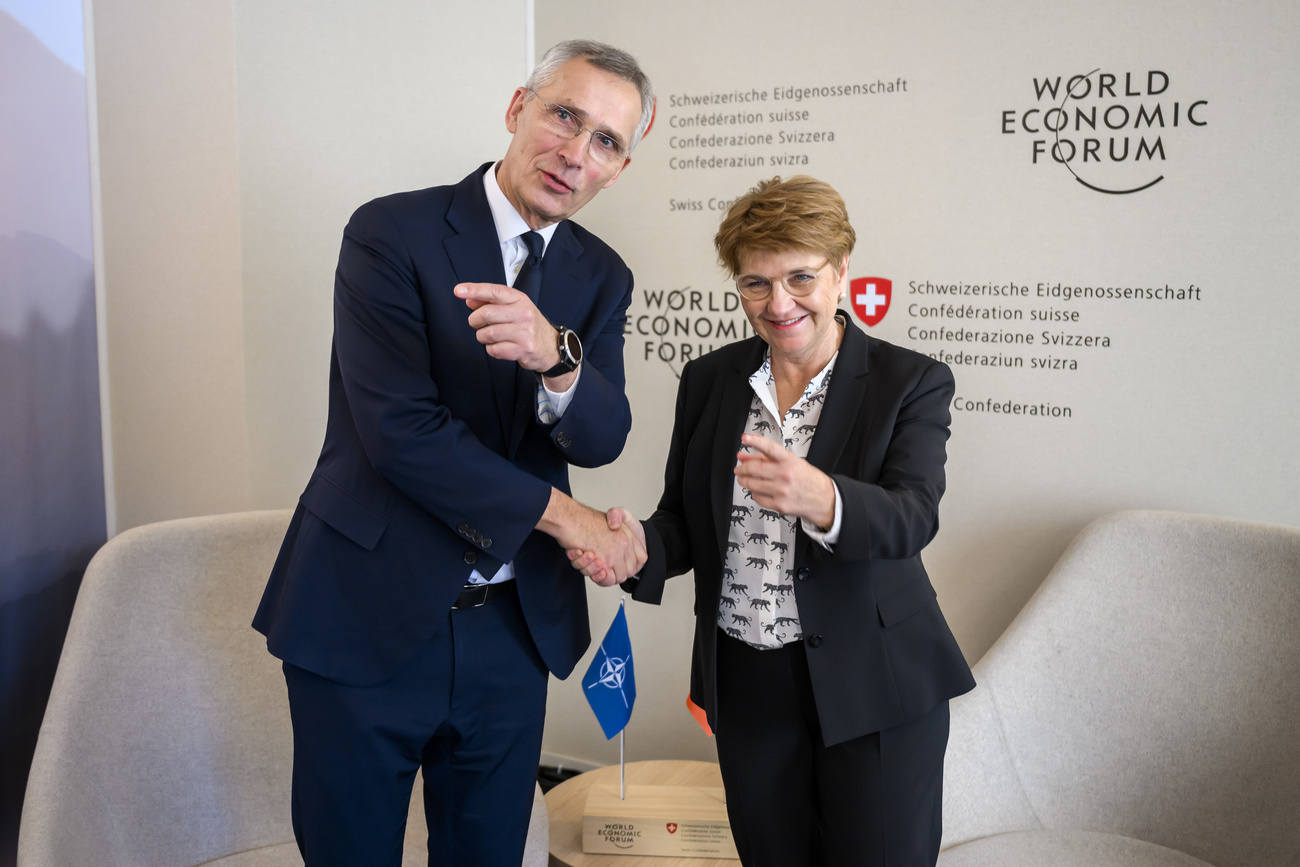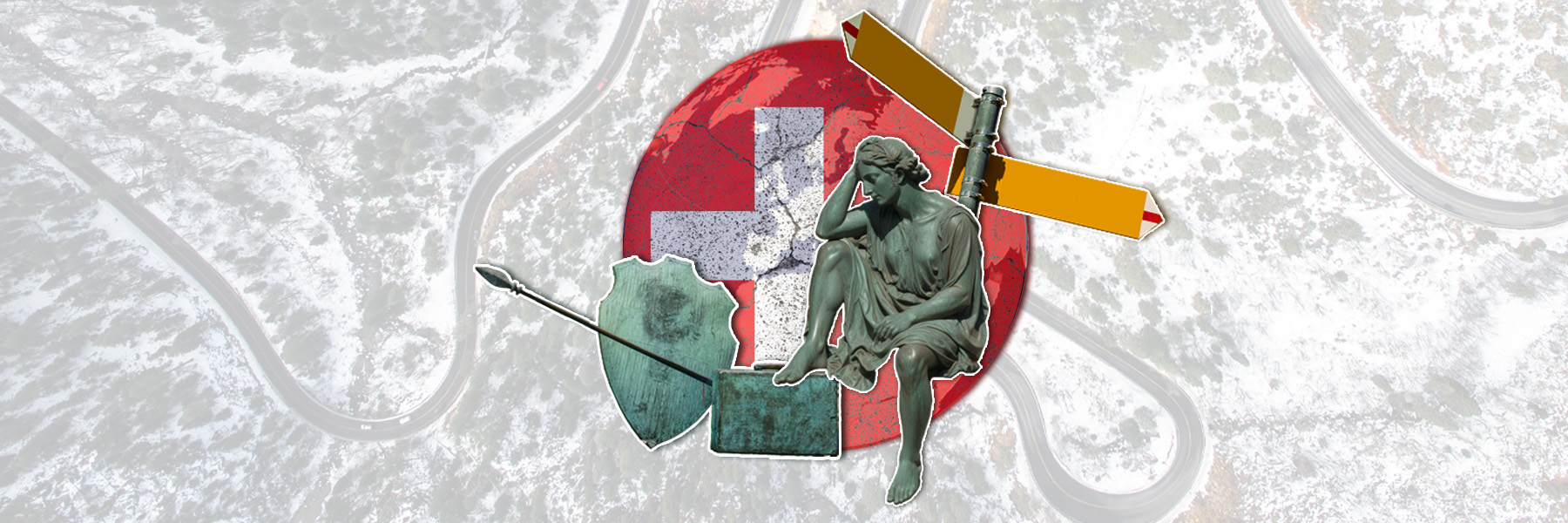
Switzerland and NATO: just flirting or the start of a wild marriage?

Following neutral Switzerland’s announcement that it wants to achieve “closer, institutionalised cooperation” with defence alliance NATO, we look at the main questions and issues in the complicated relationship.
Who is part of NATO?
The North Atlantic Treaty Organization is a military alliance of 31 statesExternal link (all European apart from the United States and Canada). The founding treaty was signed by 12 members in Washington, DC, on April 4, 1949.
+ Switzerland announces intent to deepen NATO cooperation
Originally a military alliance to counter the Soviet Union, since the fall of the Berlin Wall it has promoted security in Europe more broadly by integrating new challenges such as terrorism, cyberwarfare and the rise of China.
NATO is committed to the principle of collective defence, which states that “an attack against one or several of its members is considered as an attack against all”. So far, this principle (Article 5 of the Washington Treaty) has been invoked once – in response to the 9/11 attacks in the US in 2001.
NATO headquarters are in Brussels, Belgium, and since 2014 the secretary general has been Jens Stoltenberg, a former prime minister of Norway.
What’s Switzerland’s relationship to NATO?
Switzerland is officially neutral and is not a member of NATO. However, since 1996 it has taken part in NATO’s Partnership for Peace programmeExternal link. This involves bilateral military cooperation and sharing of information and experiences. There are no binding legal obligations, such as collective defence.
The Swiss Armed Forces have taken part in the NATO-led international peacekeeping force in Kosovo since 1999. This has triggered Swiss politicians across the spectrum: some on the left have denounced the militarisation of Swiss foreign policy, while others on the right claim it undermines neutrality.

More
What does the future hold for Swiss neutrality?
In March 2022 the Swiss ambassador to NATO, Philippe Brandt, told SWI swissinfo.ch in an interview that Swiss neutrality was one of the foundations of Switzerland’s partnership with NATO, which, in his opinion, was “stable and fruitful”.
Why is Switzerland considering getting closer to the military alliance?
“In view of the significant deterioration in the security situation there is a need to strengthen Switzerland’s defence capability,” the government said in a statementExternal link on January 31. “In addition, security and defence policy will be geared more consistently to international cooperation, especially with NATO, the EU and neighbouring countries.”
The Russian invasion of Ukraine in February 2022 shook up the European security framework. NATO, which French President Emmanuel Macron had dismissed in 2019 as becoming brain-deadExternal link, has got a new lease of life with the accession of Finland last year and once-neutral Sweden next in line to join.
+ Explainer: Russia pushes Europe’s neutral states closer to NATO
Since the war in Ukraine there has been much debate in Switzerland about a rapprochement with NATO, and the move has found support in almost all political camps and among the public. The question is how close this cooperation should be.
A few weeks after the invasion, Thierry Burkart, president of the centre-right Radical-Liberal Party, argued in an op-edExternal link in the Neue Zürcher Zeitung that it was time for “the end of hedgehog Switzerland”, which just rolls up into a spiky ball when in trouble but does nothing when other countries are attacked. “Switzerland’s security policy is at an impasse,” he wrote. “Russia’s attack on Ukraine reveals this ruthlessly.”

Soon afterwards Burkart’s Radical-Liberal colleague Damien Cottier wrote in an op-edExternal link for Le Temps that Switzerland was fortunately not at risk of aggression from its immediate neighbours: a “barrier” of NATO member states separated it from Russia. “But the hope that we will be protected free of charge is a dangerous pipe dream. Our country cannot be a freeloader when it comes to European security,” he said.
At the highest level, in March 2023 Viola Amherd became the first Swiss defence minister ever to take part in NATO’s North Atlantic CouncilExternal link. In a bilateral meeting in Brussels, Secretary General Jens Stoltenberg told Amherd that Switzerland’s neutrality was not an obstacle to working with NATO, and he welcomed Bern’s commitment to deepening cooperation with the alliance. The two also met at the World Economic Forum (WEF) in the Swiss resort of Davos last month.
The compromises Switzerland would have to make to gain access to NATO’s protection, including its “nuclear umbrella”, are unclear. But, according to Le Temps, when they met in Brussels Stoltenberg urged Amherd not to sign and ratify the UN Treaty on the Prohibition of Nuclear Weapons. Pressure from NATO, but also from three of its members – the US, Britain and France – was said to be very strong.
+ Switzerland urged to join NATO’s united front against Putin
Will Switzerland ever join NATO?
Never say never, but at the moment it seems highly unlikely. “Switzerland is not interested in NATO membership; we simply don’t need it,” Lea Schaad, a security researcher at the federal technology institute ETH Zurich told SWI swissinfo.ch. “Not only is there no reason for us to join – membership would even be a disadvantage: we would lose our neutrality.”
Schaad believed NATO was more interested in Switzerland remaining a place where diplomacy could be conducted. “Other countries benefit from having a neutral state where meetings can be held. Geneva wouldn’t be Geneva were Switzerland in NATO,” she said.
Indeed, Swiss membership of NATO is out of the question, according to the defence ministry. “NATO membership is not compatible with Swiss neutrality,” declared spokeswoman Carolina Bohren in 2022. “If Switzerland were the subject of an armed attack, neutrality would be null and void.” Switzerland would not only be allowed to defend itself militarily, she said, it could also join forces with other countries, for example with neighbouring states.
For its part, NATO says membership is open to “any other European state in a position to further the principles of this [Washington] Treaty and to contribute to the security of the North Atlantic area”.
So how will the relationship develop?
“All I’m saying is that under the current circumstances, there shouldn’t be any bans on thinking,” said Stefan HolensteinExternal link, president of one of the largest associations of Swiss soldiers, in 2022 after he said he no longer ruled out Switzerland joining NATO.
“Of course, armed neutrality is part of Switzerland’s DNA. However, we’ve been involved in the NATO Partnership for Peace programme since 1996 and in the peacekeeping mission in Kosovo under NATO command since 1999. We should see our security system in a broader context.”
When asked what form this could take, he gave the example of integrating Swiss air defence into the NATO air defence system and its command and communication structure. “That would be a rapprochement with NATO but not accession,” he said. “To put it somewhat crudely: ‘Flirt yes, marry no!’”
Surveys repeatedly show that the Swiss public agrees, with most Swiss wanting closer ties with NATO but drawing the line at becoming a member. Time will tell whether the Swiss government manages to please everyone, anyone or no one.

More
Inside Geneva: Neutrality, NATO, and the new world order

In compliance with the JTI standards
More: SWI swissinfo.ch certified by the Journalism Trust Initiative






























You can find an overview of ongoing debates with our journalists here . Please join us!
If you want to start a conversation about a topic raised in this article or want to report factual errors, email us at english@swissinfo.ch.